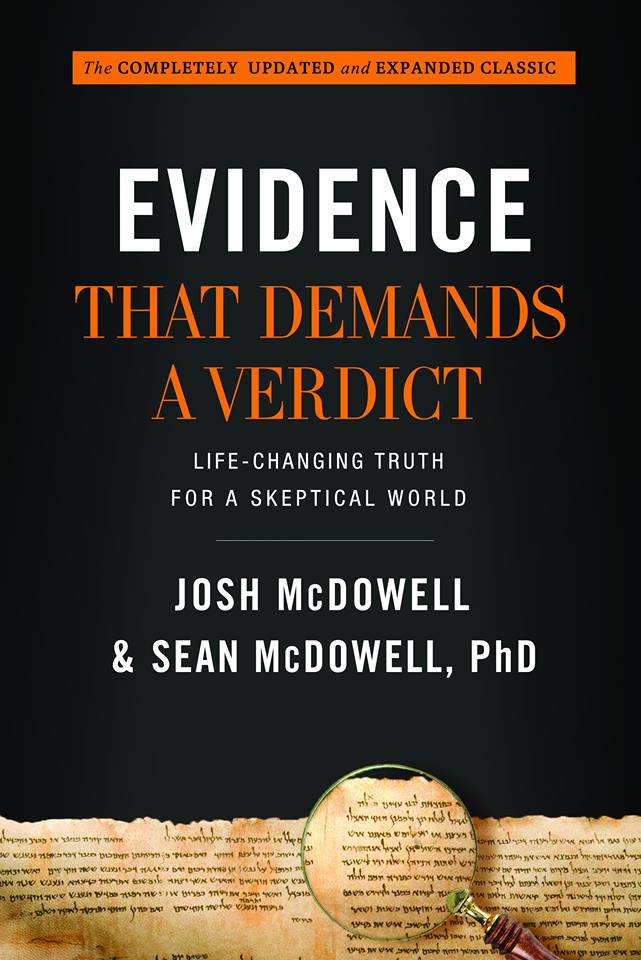By: Brian Chilton and Jason Kline | September 11, 2017
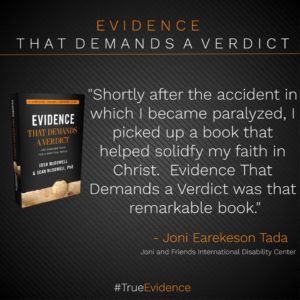 I (Brian) was saved near the age of seven and was called into the ministry at the age of 16. However, in the late 90s during the rise of the Jesus Seminar, my faith was challenged due to the Seminar’s findings. They claimed that only a small portion of Jesus’ statements in the canonical Gospels could be accepted as genuine. I asked some Christian leaders who were influential in my life if I could trust the Bible. My conversation went in the following order. I asked, “How do I know that I can trust the Bible?” “Because it’s the Bible,” retorted the leader. “But, how do I know that it’s true?” “Because it’s the Word of God!,” the leader angrily responded. “But, how do I know that the Bible is the Word of God,” I pressed. Now red in the face, the leader said, “Because it says so!” Due to the lack of available answers at the time, my doubts overwhelmed me causing me to leave the ministry and wading in the waters of theistic-leaning-agnosticism.
I (Brian) was saved near the age of seven and was called into the ministry at the age of 16. However, in the late 90s during the rise of the Jesus Seminar, my faith was challenged due to the Seminar’s findings. They claimed that only a small portion of Jesus’ statements in the canonical Gospels could be accepted as genuine. I asked some Christian leaders who were influential in my life if I could trust the Bible. My conversation went in the following order. I asked, “How do I know that I can trust the Bible?” “Because it’s the Bible,” retorted the leader. “But, how do I know that it’s true?” “Because it’s the Word of God!,” the leader angrily responded. “But, how do I know that the Bible is the Word of God,” I pressed. Now red in the face, the leader said, “Because it says so!” Due to the lack of available answers at the time, my doubts overwhelmed me causing me to leave the ministry and wading in the waters of theistic-leaning-agnosticism.
It wasn’t until July of 2005 when I entered a local Lifeway Christian Bookstore that I found a book that answered the questions that I had. That book, in addition to others, was Evidence that Demands a Verdict (henceforth, termed Evidence). Ironically, I now have the privilege of being part of a launch team for a newly updated edition of Evidence, the very book that was influential in leading me back to the faith, the ministry, and into an all new passion for theology and apologetics. Before we examine the book, let’s hear how Jason was impacted by Evidence.
I (Jason) have been a Christian most of my life, though I have not always followed Christ. Let’s just say that I travelled down many broken roads before completely giving my life to Jesus. When I left out on my own, my faith was a house built on sand. Unfortunately, this is the case for many in our churches today. Had I built my faith on more than feeling, but on something more substantial like truth, I might not have so easily wavered in the truth. Connecting the heart with the head is vital to Christian maturity (2 Peter 3:17-18). Josh McDowell states, “Instead of feelings justifying truth, truth needs to justify our feelings.”[1] I have made it my goal in life to help raise awareness to young men and women to the need of theological training and education and of the immediate access to resources in Christian theology and apologetics like never before. What we need is a generation of Christians to know what we believe, why we believe it and, not only how to live it, but also how to defend it.
Ever since my journey through seminary, my faith has grown strong and unwavering even in the midst of doubt. But, one need not a seminary level education to have access to answers and a growing faith. It was the first edition of Evidence that introduced me to apologetics. Having read through Josh and Sean’s newest edition (completely updated and revised), I predict that it will have significant influence on many more generations to come.
As part of this review, this article will provide a brief summary of the book, will show the differences between the old and new editions, will show strengths and weaknesses of the book, and will provide the benefits of having the book in your library.
Summary of Evidence That Demands a Verdict (Brian Chilton).
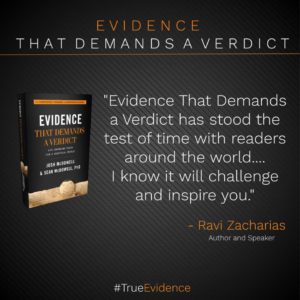 In the new Evidence, one will need to spend a good deal of time in the Introduction and Prologue. The introduction of the book discusses intellectual faith and counters misconceptions about Christianity. The introduction is greatly revised from earlier editions. The prologue is a major chapter of the book. It is entitled “Prologue: A Theistic Universe.” This chapter features all new scientific and philosophical information to Evidence that was not covered in earlier editions.
In the new Evidence, one will need to spend a good deal of time in the Introduction and Prologue. The introduction of the book discusses intellectual faith and counters misconceptions about Christianity. The introduction is greatly revised from earlier editions. The prologue is a major chapter of the book. It is entitled “Prologue: A Theistic Universe.” This chapter features all new scientific and philosophical information to Evidence that was not covered in earlier editions.
Evidence has four major parts: Part I: Evidence for the Bible, Part II: Evidence for Jesus, Part III: Evidence for the Old Testament, and Part IV: Evidence for Truth. Part I consists of a chapter on the formation and canonization of Scripture, substantially revised chapters on the uniqueness of the Bible, on the reliability of the New Testament and the transmission of the Old Testament, as well as an all new chapter on Gnostic Gospels and non-biblical texts.
The second part focuses on evidence for Jesus of Nazareth. This section consists of lightly revised chapters on Jesus’ historicity, Jesus’ claims to deity, the classic trilemma,[2] Jesus’ fulfillment of OT prophecies, as well as an investigation on the deity of Jesus. The chapter on Jesus’ resurrection has been majorly revised. The section also includes new content including a chapter responding to the claim that Christianity is a copy-cat religion and Sean McDowell’s research on the martyrdom of the apostles.[3]
The third section investigates the evidence for the Old Testament. Almost all of this section is new. A new chapter investigates the influences of Near Eastern texts on the Old Testament and to what degree it occurred. Other new chapters include one that investigates the historical Adam, the historicity of the Patriarchs, the historicity of the Exodus, the historicity of the Conquest, the historicity of the United Monarchy, the historicity of the Divided Monarchy and Exilic Period, the composition of the Pentateuch, an argument for the unity of Isaiah, the historicity of Daniel, and a response to the so-called contradictions in the Old Testament. Only the chapter on Old Testament archaeology is found in earlier editions of Evidence and it has been substantially updated.
The fourth section is devoted to the evidence for truth. Chapter 28: The Knowability of Truth has been lightly revised. The remainder of the chapters in this section have been substantially updated, including a chapter on the nature of truth, a response to postmodernism, a response to skepticism, the possibility of miracles, and the knowability of history.
While the epilogue is much the same as previous editions, the appendix includes an all-new response to the challenges given by Dr. Bart Ehrman. As Jason Kline states in this article, this is not the same Evidence as in previous editions. It is even better!
Differences from the First Edition (Jason Kline).
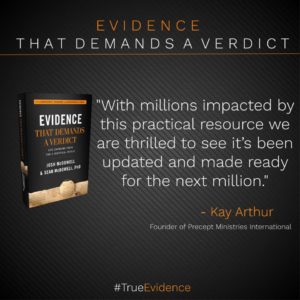 Now, I have to admit that when I first heard Evidence was going to be updated, I was thrilled. But, then, my skepticism quickly set in: “How different will it be? Is the newest version worth buying? Should I sell my copy of Evidence to justify buying the newest version?” All my questions were quickly answered learning that it is now co-authored. Sean McDowell, PhD is a Professor at one of the world’s leading Christian schools, Biola University. His presence in this book, and what he brings to the content, I must agree, adds “new depth…and sharper perspective and insight to answer questions being asked today” by this generation. [4]
Now, I have to admit that when I first heard Evidence was going to be updated, I was thrilled. But, then, my skepticism quickly set in: “How different will it be? Is the newest version worth buying? Should I sell my copy of Evidence to justify buying the newest version?” All my questions were quickly answered learning that it is now co-authored. Sean McDowell, PhD is a Professor at one of the world’s leading Christian schools, Biola University. His presence in this book, and what he brings to the content, I must agree, adds “new depth…and sharper perspective and insight to answer questions being asked today” by this generation. [4]
The prologue is completely new! Unlike previous editions, Josh and Sean offer several clear arguments for a theistic universe, setting “the stage for the many evidences for Christianity.”[5] I like this change as it takes a more clearly classical stance of case making toward theism, allowing the book to be better-rounded. I cannot forget to mention their new material on Undesigned Coincidences, a subject having made a more recent renaissance into the market place of ideas on internal Biblical consistencies thanks to Dr. Tim and Lydia McGrew. This section alone speaks to the benefits this revised and expanded edition of Evidence offers.
When I initially began my reading of the text, I quickly realized, “This is not the same book!” The amount of changes made to this edition are significant, giving credence to their claim a “completely updated and expanded.”[6] 49% of the book consists of all new content, 31% is substantially revised with new content, and 20% has been lightly revised (see “Summary of Evidence” for more details”).[7]
Strengths and Weaknesses (Brian Chilton).
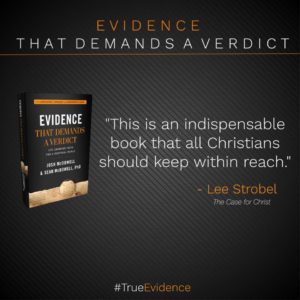 The strengths of this book are immense. First, the book answers the major historical objections to the Christian faith. The overwhelming evidence presented for Jesus’ historicity and the reliability of Scripture is mind-boggling. Second, the book is extremely well researched. The authors provide massive amounts of quotations from key scholars in the field. Third, the book succeeds in what it sets out to do: it establishes the veracity of orthodox Christian faith. Nearly all of the major objections to the Christian faith are answered in this book.
The strengths of this book are immense. First, the book answers the major historical objections to the Christian faith. The overwhelming evidence presented for Jesus’ historicity and the reliability of Scripture is mind-boggling. Second, the book is extremely well researched. The authors provide massive amounts of quotations from key scholars in the field. Third, the book succeeds in what it sets out to do: it establishes the veracity of orthodox Christian faith. Nearly all of the major objections to the Christian faith are answered in this book.
Almost every book will have a few weaknesses. The first weakness is seen in only a few portions of the book. In some sections, an overwhelming number of quotations are given to the point that one is hard-pressed to hear the authors voice. Second, in my (Brian’s) opinion, a greater emphasis could have been given for the early dating of the Gospels. Finally, it seems to me (Brian) that rather than offering the evidence for God in the prologue, a fifth section should have been developed for this endeavor. The cosmological, teleological (design), ontological, and moral arguments all deserve a chapter of their own.
All-in-all, I believe the strengths of Evidence far outweigh any weaknesses. I strongly advise anyone who is interested in apologetics to purchase this book and share it with those who may be struggling in the faith. I give this book 5 stars all the way!
Benefits of the New Edition (Jason Kline).
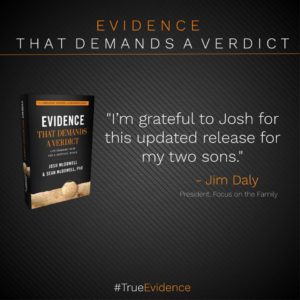 One of the benefits of the book is consolidation. This is a reference book. However, their use of extensive scholarly references to substantiate their claims makes Evidence even more than a reference book. It is an all-in-one library of resources at one’s finger tips. What I have found is that they have basically taken my entire library, and then some, and consolidated it into one book. Not only is this convenient, but it makes case-making affordable for everyone who wants at least one authoritative apologetic resource in their Christian Library.
One of the benefits of the book is consolidation. This is a reference book. However, their use of extensive scholarly references to substantiate their claims makes Evidence even more than a reference book. It is an all-in-one library of resources at one’s finger tips. What I have found is that they have basically taken my entire library, and then some, and consolidated it into one book. Not only is this convenient, but it makes case-making affordable for everyone who wants at least one authoritative apologetic resource in their Christian Library.
Another benefit to this book is that it offers an overall consensus of what is being discussed (and sometimes agreed upon) among scholarly circles giving the layman insight and access to the state of academia. One will get both sides of important conversations with the consensus given afterwards.
For me, I have found that Evidence whets one’s appetite for the overwhelming nature of apologetics and interestingly, helps the reader discover closely the areas of personal interest for future study/research. The benefit of this is immense. Rather than buying multiple apologetic books in order to get up to par on making a well-rounded case for Christianity, this is a one stop shop. I conclude that Evidence is the book for every believer interested in having general knowledge in apologetics and as a reference tool in times of doubt.
Evidence that Demands a Verdict will be available in bookstores everywhere October 3rd, 2017. Pre-order your copy today for added bonuses by going to http://www.readevidence.com. We both highly recommend this resource.
Links
Pre-order Evidence that Demands a Verdict:
To pre-order the all new Evidence that Demands a Verdict, go to http://www.readevidence.com. There are pre-order bonuses if Evidence is ordered before the October 3rd release date.
Special Pre-Publication Preview:
http://media.harpercollinschristian.com/files/Bibles/Evidence/EvidencePre_ReleaseSampler.pdf
Videos from Josh and Sean McDowell:
https://www.youtube.com/playlist?list=PLG1Vw3N94xzObCIpo1VILHPxguJRgZJC3
Notes
[1] Link to Special Pre-Publication Preview. http://media.harpercollinschristian.com/files/Bibles/Evidence/EvidencePre_ReleaseSampler.pdf
[2] The trilemma is C.S. Lewis’ classic paradigm in claiming that Jesus must either be a liar, a lunatic, or the Lord of all creation.
[3] Chapters 8 11, and 13 are worth the price of the book alone.
[4] Pre-Publication Preview, http://media.harpercollinschristian.com/files/Bibles/Evidence/EvidencePre_ReleaseSampler.pdf.
[5] Ibid.
[6] Ibid.
[7] Ibid.
About the Authors
 Brian Chilton is the founder of BellatorChristi.com and is the host of The Bellator Christi Podcast. He received his Master of Divinity in Theology from Liberty University (with high distinction); his Bachelor of Science in Religious Studies and Philosophy from Gardner-Webb University (with honors); and received certification in Christian Apologetics from Biola University. Brian is in the Ph.D. program in Theology and Apologetics at Liberty University. Brian is full member of the International Society of Christian Apologetics and the Christian Apologetics Alliance. Brian has been in the ministry for over 14 years and serves as the pastor of Huntsville Baptist Church in Yadkinville, North Carolina.
Brian Chilton is the founder of BellatorChristi.com and is the host of The Bellator Christi Podcast. He received his Master of Divinity in Theology from Liberty University (with high distinction); his Bachelor of Science in Religious Studies and Philosophy from Gardner-Webb University (with honors); and received certification in Christian Apologetics from Biola University. Brian is in the Ph.D. program in Theology and Apologetics at Liberty University. Brian is full member of the International Society of Christian Apologetics and the Christian Apologetics Alliance. Brian has been in the ministry for over 14 years and serves as the pastor of Huntsville Baptist Church in Yadkinville, North Carolina.
 Jason Kline is a resident chaplain for Mountain Valley Hospice and Palliative Care of Southwest Virginia. Jason graduated with a Master of Divinity from Liberty University. Jason also received his Bachelor of Science in Business and Religion from Liberty University as well as his certification in Christian Apologetics from Biola University. Jason is a full member of the International Society of Christian Apologetics and the Christian Apologetics Alliance. Jason proudly served his country in the United States Air Force. Jason, a regular contributor of BellatorChristi.com, is currently researching the soul and is interested in how the soul influences the counseling process.
Jason Kline is a resident chaplain for Mountain Valley Hospice and Palliative Care of Southwest Virginia. Jason graduated with a Master of Divinity from Liberty University. Jason also received his Bachelor of Science in Business and Religion from Liberty University as well as his certification in Christian Apologetics from Biola University. Jason is a full member of the International Society of Christian Apologetics and the Christian Apologetics Alliance. Jason proudly served his country in the United States Air Force. Jason, a regular contributor of BellatorChristi.com, is currently researching the soul and is interested in how the soul influences the counseling process.
© 2017. BellatorChristi.com.

